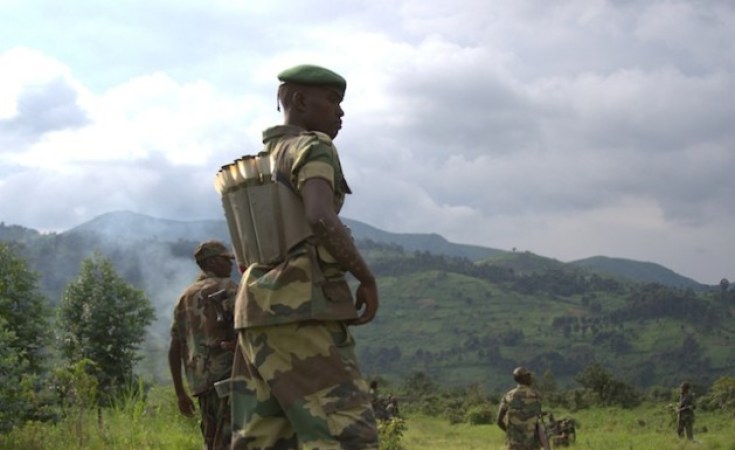M23 rebels have captured the towns of Kanyabayonga and Kirumba in the eastern DRC. Lack of international pressure and the troubled state of the Congolese military facilitated their success, experts told DW.
This ongoing conflict in the Democratic Republic of Congo (DRC) and throughout the region has intensified - leading to widespread displacement and raising serious concerns about the humanitarian situation in North Kivu Province in particular.
On June 28th and 29th, M23 rebels in the Eastern DRC captured the towns of Kanyabayonga and Kirumba, respectively.
Kirumba residents like Tsongo Augustin say more and more people have been forced out of the area, which had become home to many who already had been displaced by the conflict.
"Kirumba is gradually being deserted by the population, and therefore the humanitarian situation is very complicated. This area has welcomed many displaced families from Rutshuru, and now they are fleeing again," Augustin said.
Strategic importance of region
Kirumba is the largest settlement in the Lubero territory with a population of over 120,000.
Kanyabayonga meanwhile is home to more than 60,000 people, but tens of thousands of people had fled there in recent months, driven from their homes by the advance of the rebels.
The region considered to be a "strategic stronghold, which is meant to block the rebels' advance towards the country's Grand North region," said Professor Adolphe Agenonga Chober, a lecturer at the University of Kisangani, who is also an expert on armed movements.
Soaring humanitarian crisis -- and frustration
The capture of Kanyabayonga and Kirumba has now triggered another bout of mass displacement, compounding an already dire humanitarian situation.
"The question we ask ourselves is where will all these displaced families go?" Augustin said.
Others feel disillusioned with those in leadership; Wema Kennedy, a resident of Kirumba, complained that the community is "not seeing the government doing anything to take control of the territories captured by M23."
"Bunagana for instance has been under M23 for about two years now, and many are scared that it will not be easy for the government to retake control of Kirumba. We have the impression that M23, which started as a minor group, is today overpowering everything, and because of this, people are frustrated," she told DW.
A recent attack on a convoy in North Kivu province further exacerbated the security situation and humanitarian crisis in the area -- and beyond. Two South African soldiers were kiled in such recents attack, and two members of aid staff are still missing.
The UK-based international Christian relief and development organization Tearfund said in a statement that is condemned the attack on humanitarian workers "who are working tirelessly to serve the people of the DRC."
"We urge all parties to respect and protect aid workers, ensuring their safety as they carry out their vital mission," Tearfund said.
Silence from the international community
The international community and the African Union meanwhile have remained largely silent on these latest developments amid escalating tensions. Professor Agenonga attributes this to a divergence of interests and approachesÖ
"The international community and the African Union are advocating for dialogue between the parties involved in this conflict -- an approach rejected by the government in Kinshasa," Agenonga told DW, adding that "this also does not seem to be doing enough to change the situation and stop the M23 from advancing."
The Norwegian Refugee Council (NRC) has reiterated the severity of the humanitarian crisis in the DRC. Eric Batonon, country director of the NRC for Congo, said that action had to be taken urgently.
"It is really important that the international community and all world leaders come together to try to find a solution to these conflicts, and allow millions of women and children to return home and safeguard a safe future for them," Batonon said.
Accusations against DRC military
The Congolese army's performance meanwhile has also come under scrutiny, with accusations of passivity amid escalating attacks and ineffective command structures.
Augustin Muhesi, a political science professor in eastern DRC, underscored the need to reassess the army's strategy:
"This could be related to the morale of soldiers. Many have been fighting for a long time without rest. I am among those who think that we should also consider replacing these soldiers," Muhesi told DW, citing coordination issues due to overlapping command structures in North Kivu as another factor.
Alleged squirmishes among army commanders are also frustrating local, boiling over into violence. Youth in the town of Butembo have attacked army officers, accusing them of inaction.
"We believe there is a problem with the leadership hierarchy on the front line, and that is what angers the population," Mathe Saanane, president of the Butembo civil society told DW.
A president in crisis mode
In response to the M23's advances, Congolese President Félix Tshisekedi convened a Defense Council meeting and reassured the nation of his commitment to preserving the country's territorial integrity.
In his Independence Day address on June 30, Tshisekedi expressed his concern forthe affected populations.
"I cannot ignore the grave security situation shaking our country. To our brothers and sisters in Kanyabayonga and the surrounding regions, I want to express my deep solidarity and compassion in the face of the suffering you endure," he declared.
However, his words of affirmation may fall on deaf ears, as North Kivu province has now been racked by violence since 2021, when the M23 rebel group first resumed its armed campaign in the region.
Edited by: Sertan Sanderson


